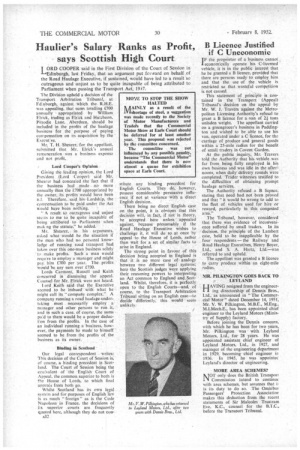Haulier's Salary Ranks as Profit, says Scottish High Court
Page 34

If you've noticed an error in this article please click here to report it so we can fix it.
ORD COOPER said in the First Division of the Court "Edinburgh, last Friday, that an argument put fo/ward the Road Haulage Executive, if sustained, would have led outrageous and unjust as to be quite incapable of being Parliament when passing the Transport Act; 19%7.
he Division upheld a decision of the Transport Arbitration Tribunal, at Edmburgh, against which the R.H.E. was appealing, that sums totalling £700 annually appropriated by William Elrick, trading as Elrick and Hutcheon, Pittodie Lane, Aberdeen, should be included in the profits of the haulage business for the purpose of paying compensation on its acquisition by the Execut:ve.
Mr. T. H. Shearer, -for the appellant, submitted that Mr. Elrieles annual remuneration was a business expense and not profit.
• Lord Cooper's OWnion Giving the !Codling opinion, the Lord President (Lord Cooper) said Mr. Shearer had concealed the fact that if the business had made no more annually than the £700 appropriated by the owner, its profits would have been n.l. Therefore, said his. Lordship, the cenneensation to be paid under the Act would haye been noth:ng.
" A result so outrageous and unjust seems to me to be quite incapable of being attributed to Parliament when rmik ng the statute." he added.
Mr. Shearer, in his arguments, asked what would be the situation if the man who had no personal knowledge of running road transport had. taken over this one-man business solely "tomake profits. Such a man would requ:re to employ a manager and might pay. him E700 per year. The profits -would be any sum over £790.
Lords Carmont, Russell and Keith concurred in dismissing the appeal. Counsel for Mr. Elrick were not heard.
I ord. Keith said: that the Executive seemed to be imbued with what he might call its " company complex." A company running a road haulage-under-. taking must necessarily employ a manager and other persons to run it, and in such a case, of course, the sums paid to them would be a proper deduction from the profits. In the case of an individual running a business, however, the payments he made to himself seemed to be from the profits of the business as its owner.
'Binding in Scotland
Our legal correspondent writes: This decision of the Court of Session is, of course, a binding precedent in Scotland. The Court of Session being the equivalent of the English Court of Appeal, the common superior to both is the House of Lords, to which final appeals from both go.
Whilst Scotland has its own legal system and for purposes of English law is as much " foreign " as is the Code Napoleon in Prance, the decisions of its superior courts are frequently quoted here, although they do not con stitute any binding precedent for English Courts. They do, however, possess considerable persuasive influence if not at variance 'With -a direct
English decision. • • There being no direct English case on the point, it is obvious that this decision will,in fact, if not in .theory, be accepted here unleSs appealed against, because presumably, if the Road Haulage Executive wishes to challenge it, it will do so at once by appeal to the House of Lords, rather than wait for a set of similar facts to arise in England.
The strong point in favour of this decision being accepted in England is that it is no mere case of analogy between two different legalsystems; here the Scottish judges were applying their reasoning powers to interpreting an Act common to England and.Scotland. Whilst, therefore, it is perfectly .open to the English Courts—and, of course, to the Transport Arbitration Tribunal sitting on an English case—to :decide differently, this would seem unlikely.




























































































